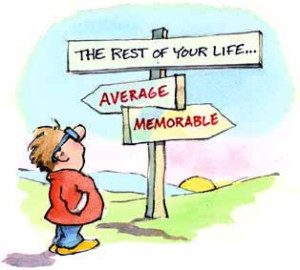A lot of us feel the pressure of making the perfect choice, when it really does not exist. What we should do instead is find choices that align with our values and be open to learning from whatever outcome we get. These five guideposts will make the process easier. (Estimated reading time: 4 minutes)
“Where perfection exists, shame is always lurking.”
— Brené Brown
Perfection is a mirage that many of us attempt to reach at several points in our life.
Like weary desert dwellers, we thirst for the waters of this illusory oasis, which we believe will quench our thirst for glory.
The mirage might be a projection of our desire for the perfect partner, job, home, bank balance, etc.
While there’s no doubt that we will experience an initial sense of happiness and accomplishment, after a while, our joy will gradually diminish once the novelty wears off.
Sooner or later, driving that Bentley will become mundane, or that diamond necklace will lose its luster, or your attractive mate will start getting on your nerves.
The unrealistic standards that come from a need for perfection were developed in our youth. Because our performance at school, extra-curricular activities and the social sphere were constantly under the magnifying glass, many of us were under a lot of pressure to perform well in all these areas.
If we did not meet the expectations of our family, teachers or peers, we did not get their approval. Hence, from early on, we learned that the only way to be accepted by others was by creating a perfect life.
A majority of the children who had to meet high expectations grow into adults who fear the decision-making process, because they are so afraid of getting it wrong and failing.
While it’s important to motivate kids to strive to do their best, what isn’t right is placing heavy demands on them to get it right every single time, and admonishing them if they make choices that lead to learning experiences.
According to motivation coach and speaker, Tony Robbins – one of the major causes of pain that people experience nowadays is caused by their inability to let go of these rules, and trust the natural flow of life.

So many people are fixated on doing things in a specific way, which end up severely limiting their growth and progress.
Here are some guideposts that we can use to get over our need to make the “perfect choice” and get back into balance:
1. Sometimes, you have to make wrong choices in order to make the right ones: When we try out different options, we become more self-aware by learning what works for us and what doesn’t. We may have to work in a 9-5 job for a couple of years to realize that we would much rather be our own boss. We may have to kiss a few frogs before knowing what kind of person floats our boat. In this way, we gain wisdom and valuable feedback.
2. Every choice will have its own pros and cons: Novelty can give us rose-colored glasses, but when the rosy tint fades away, we will be able see the disadvantages in every choice. For this reason, it’s important for us to figure out what our deal-breakers are and what sacrifices we are willing to make before making any important decisions. We feel more at ease when we embrace this paradox of choice.
3. Strive for making the most authentic choice, versus the perfect one: An authentic choice is simply one that feels right to us and is in alignment with our values and purpose. Even if it isn’t the easiest path or it doesn’t look pretty on the outside, if it is in integrity with what’s most important to you, you should go ahead with it because it will eventually lead you down your highest path.
4. Don’t give in to a scarcity mindset: On an instinctual level, most of us feel the finiteness of our lives. We know that our time, energy and attention span is limited—this makes us judicious about our decisions. However, we need to watch out for slipping into a state of desperation and fear. We should instead cultivate a mindset of abundance so that this energy will be reflected in our outcomes.
5. Find joy within yourself so that you don’t have to seek it elsewhere: When we make joy a constant within ourselves, we become less dependent on sourcing it from the outside world. We can cultivate joy within us through spiritual practices, such as meditation, writing a gratitude journal, or anything that helps us go within and create balance.
Every life choice that we make is part of a complex, universal tapestry in which every single thread is interconnected. As we evolve from the wisdom of our experiences, both good and bad, we gradually learn how to weave all these threads together into one giant masterpiece.
All my best on your journey,
Seline

Question for you: Do you have a tough time making choices in your life? If yes, what’s the major obstacle and how can you begin to shift it?
Did you like this post? Sign up below and I’ll send you more awesome posts like this every week.



Have Your Say